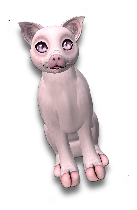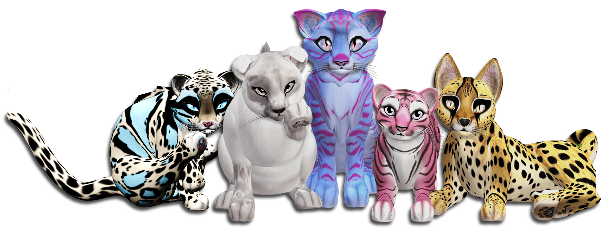
Second Life’s Cutest Cat Breedable Ever!


Strays have a total count of 9 possible traits: We tend to breed for the desired traits we want. But if you are interested in what features are rare, add the Cat HUD v1.44 to yourself, and check out the Web Tools. There are tabs there with rarities on pelts, eyes, etc., where you can see how many of each color exist for each breed.
9 Possible Traited Features: There are still cats ‘pre-whiskers’ breeding, so they will have max traits of 8.
Pelt
Eye
Eye Shape
Eye Pupil
Ears
Tails
Shade
Body style
Whiskers
You’ll know when your cats are ready to breed/mate when the text of the cats turned light blue and the very bottom ♥ line is showing 100%.
Bullet points:
~All breeds can be cross-bred, interbred, to produce some interesting results :)
Or you can breed true to a specific Breed type and/or pelt color.
~Mixing breeds will result in the baby being either the breed of the mother, or the breed of the farther.
You cannot create hybrids.
~Traits are genetically passed from mother and father to their offspring.
~Every cats has two (2) sets of DNA, inherited from it’s parents. One set consists of the visible traits you can see when you look at the traits listed. The second set are also inherited but not visible or known, until you breed them.
Not all breeds have the same colors of pelts, but there are many that occur across multiple breeds.
See your Web Tools, under the *Pelts Rarity* to see every color available for every breed.
You can also see them here, on our website.
The standard starter colors are NOT considered a trait - these are: Chocolate, Brown, Light Brown, Seal, Tawny, and of the two-tones, Blue/Red, Brown/Red, Red/Chocolate, Red/Black and Chocolate/White
With Faboo breeds, because there are no 'starter' faboos, their pelt colors are ALL considered 'traited'.
Standard genomes are more dominant, while others like Silver, Fawn, Pink, etc. are recessive, and harder to pass along.
As an example: Take this possible mating:
MALE FEMALE
Pelt: Snowshoe Tabby - Chocolate Pelt: Abysinnian - Silver
Eye Color: Sparkle Amethyst Eye Color: Two-Tone Olive/Tangerine
Eye Shape: Almond Eye Shape: Orb
Pupil: Slit Pupil: Round
Ears: Short Ears: Curl
Tail: Standard Tail: Kink
Shade: Classic Shade: Moonlight
Body: Chubby Body: Fluffy
Possible Offspring:
On the Breed and Pelt color: Because there is a silver and a chocolate genome in each of these breeds, the baby could come out either a Snowshoe Tabby Chocolate or Silver, or an Abysinnian Chocolate or Silver
The baby count get any of the traits from either parent, mixing them up entirely, or you can see a throwback trait from the family lineage that has passed down through the generations and is hidden. Both the male and female of this pairing have the set of traits you see, and a hidden set of traits, inherited. - So each cat contains two (2) sets of genes, or alleles.
Example:
Pelt: Abysinnian - Chocolate
Eye Color: Sparkle Amethyst
Eye Shape: Orb
Pupil: Slit
Ears: Curl
Tail: Standard
Shade: Blush <----- from Great-grandmother on mother's side that is hidden in the female.
Body: Chubby
This baby could carry the recessive/hidden gene for 'silver' or possibly the hidden pelt color of a parent. If used for breeding, it could give you silver babies.
All breeds but Faboos, use a standard genetic breeding code, mimicking real life.
Faboos have an additional bit of code that allows them to randomly pop out with a completely different color than the parents.
All genomes of all breeds have a set probability number in the database, making some much more rare and tougher to get.
Breeding siblings or parents-back-to-offspring can increase your chance of bringing out the hidden pelt from the parents.
ABOUT FABOOS:
Our Faboos are special, non-traditional kitties that don't necessarily always follow the rules :)
They have a combination of some genetics with their faboolous 'random' random factor. Therefore, when breeding them together you can pass a coat from the parents, or it could be a totally random coat available in their breed, and could pass a total different Faboo (rare chance).
FYI: There are NO hybrids. Crossing a tiger with a skunk will not make something else. The baby will either be tiger or skunk.
ABOUT LEs (limited editions): (Includes Zodiacs, Destinies, Elementals, Fairies, OOAKs, and specially created event Les and random drop LEs)
All LE pelts themselves do not pass. In that respect, they are collectible. But they too have a hidden gene to pass, and of course, can pass all other traits.
Breeding two LEs together will ALWAYS result in a Classic Tabby Baby with a random tabby color.
TERMINOLOGY:
DOS: An Acronym for the Direct Offspring of the two parents.
OS: It is an Acronym used for the Offspring, that could be a grandchild or further back in generations than a direct baby.
The difference in terminology between a DOS and OS is that we name OS a kitty that is not a direct offspring of a trait we want to pull out.
An Example: Two Tropical Cheetahs drop a Red Cheetah and this Red Cheetah gives birth to a Silver Cheetah. Our goal was to pass the tropical pelt. The Silver Cheetah is an OS of the tropical pelt since the tropical pelt was shown in the grandparents and the Red Cheetah is the DOS of the tropical pelt since the tropical pelt is one generation back and comes directly from the parents of the red cheetah.
GENERATION: Generation is when we breed parents of the same breed and pelt color (genome), and produce a baby of the same breed and color.
An Example: Breeding two Tabby - Red together, and producing a Tabby - Red baby. That Tabby - Red baby is considered pure 1st Generation. If this breeding had another baby like this, and you bred the 'children' together, each being pure 1st Generation, if they produced a Tabby - Red - that baby would be a pure 2nd Generation. And so on.
SIBLINGS: Those are the kittens that have the same Mom and Dad). The kittens that are siblings they do not necessarily looks exactly the same but they are carrying the same breed and pelt genes from their parents.
HALF SIBLING: When two kittens share one parent in common, but not the other.
About Breeding Strays